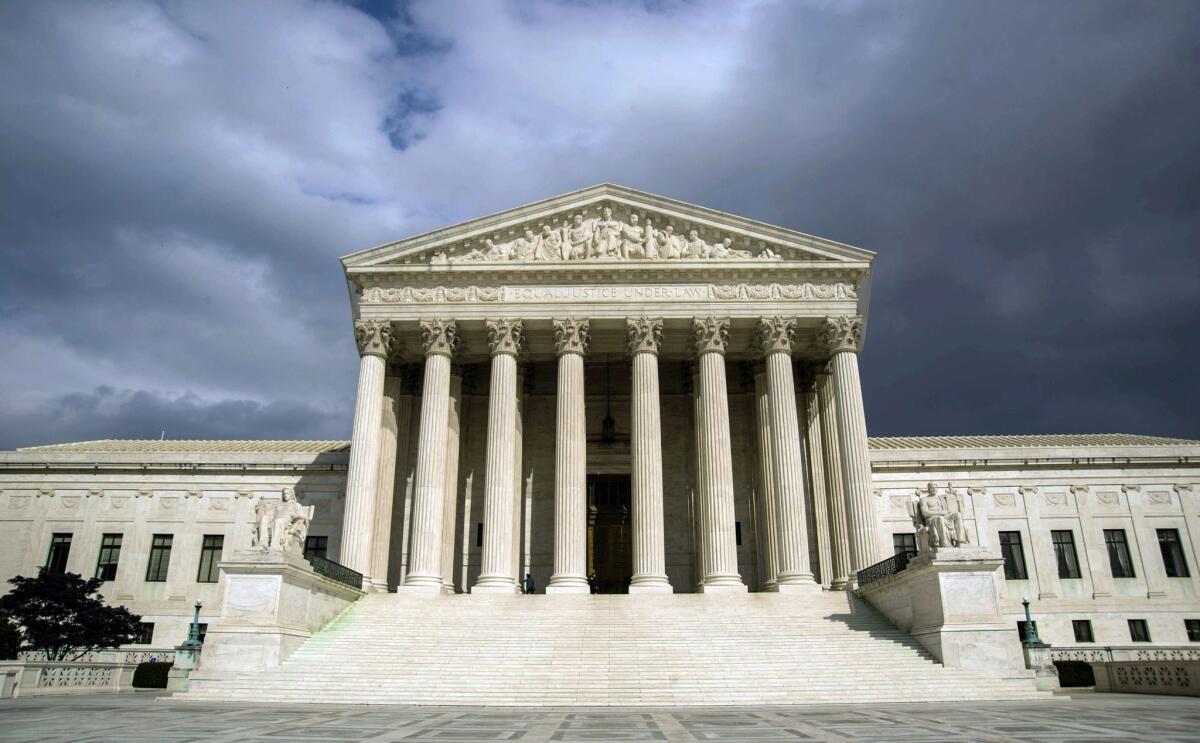Supreme Court upholds SEC’s power to take illegal profits from Orange County couple

- Share via
WASHINGTON — The Supreme Court on Monday upheld the government’s power to recoup money from people who ran suspect investment schemes and give it back to those who say they were cheated.
But the justices also put new limits on the Securities and Exchange Commission and its so-called disgorgement authority, ruling this power to recoup money is limited to the illegal “net profits” of the scheme, not all of the money that was taken in.
The mixed decision came in the case of Charles Liu and Xin Wang, an Orange County couple who solicited a total of $27 million from foreign investors for a cancer treatment center that was never built.
The SEC brought a civil action against them, alleging they had misappropriated most of the money through marketing and lavish salaries. A federal district judge and the 9th Circuit Court of Appeals agreed with the SEC and upheld an $8-million civil fine and required the disgorgement of the entire $27 million.
The couple appealed to the Supreme Court and argued that although Congress had authorized fines and penalties for stock frauds, it did not give the SEC the power to disgorge money. The conservative justices in recent years have voiced doubts about the SEC’s power, and business lawyers saw the prospect of the court rebuking and reining in the SEC.
Instead, however, the high court by a 8-1 vote ruled in favor of the SEC, but with limits.
“The court holds today that a disgorgement award that does not exceed a wrongdoer’s net profits and is awarded for victims is equitable relief permissible under” federal law, Justice Sonia Sotomayor said in Liu vs. SEC. The law has “long authorized courts to strip wrongdoers of their ill-gotten gains,” she said.
But “courts must deduct legitimate expenses before ordering disgorgement,” she added, noting Liu and Wang said much of the $27 million was spent on efforts to obtain property and gain approval for the center. Sotomayor said the case would be sent back to judges in California to subtract those expenses from a disgorgement order.
Justice Clarence Thomas dissented and said he would have ruled the SEC has no power to “disgorge” illegal gains from stock frauds.
“We’re pleased to see that the Supreme Court overturned the judgment against Mr. Liu and Ms. Wang and clarified that traditional equitable principles limit the SEC’s authority to seek an award of net profits for the benefit of victims,” said Gregory G. Rapawy, a Washington lawyer who argued for the couple in the high court.
Some experts on securities law called the outcome a major setback for the government.
“This decision reverses decades of SEC practice and puts limits on the SEC’s ability to seek disgorgement in federal court,” said Nick Morgan, a Los Angeles attorney and former SEC lawyer. “Specifically, the SEC will no longer be able to require defendants to pay money directly to the U.S. Treasury rather than victims, to pay for profits received by others, or to pay for expenses legitimately incurred in receiving funds derived from violations of federal security laws.”
But lawyers who represent whistleblowers said the court’s decision upholds the SEC’s power to recoup millions of dollars from those who run fraudulent investment schemes.
“Half of the $2 billion in SEC sanctions attributed to whistleblower cases is from disgorgement,” said Erika Kelton, a Washington lawyer. “If the court had invalidated the disgorgement remedy, whistleblowers would have faced a tougher choice as to whether to risk their livelihoods to come forward.”
Susan E. Hurd, a securities lawyer in Atlanta, said the outcome is better for the SEC than many expected. “The SEC should put this one in the ‘win column’ given that people thought initially the court was going to rule that the SEC could no longer seek disgorgement in federal court, which would have been a significant blow to the commission.”
More to Read
Get the L.A. Times Politics newsletter
Deeply reported insights into legislation, politics and policy from Sacramento, Washington and beyond. In your inbox twice per week.
You may occasionally receive promotional content from the Los Angeles Times.










